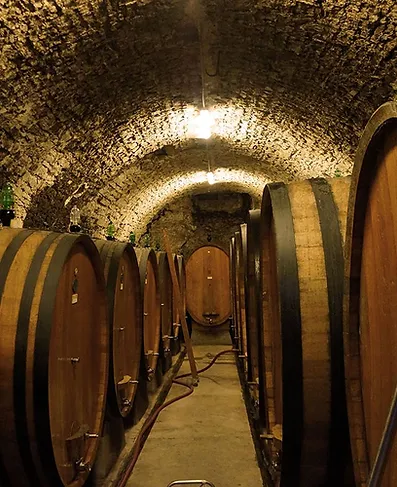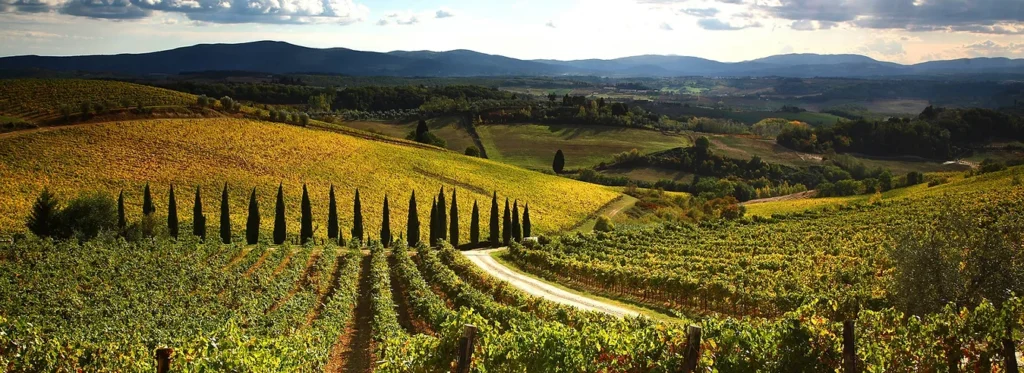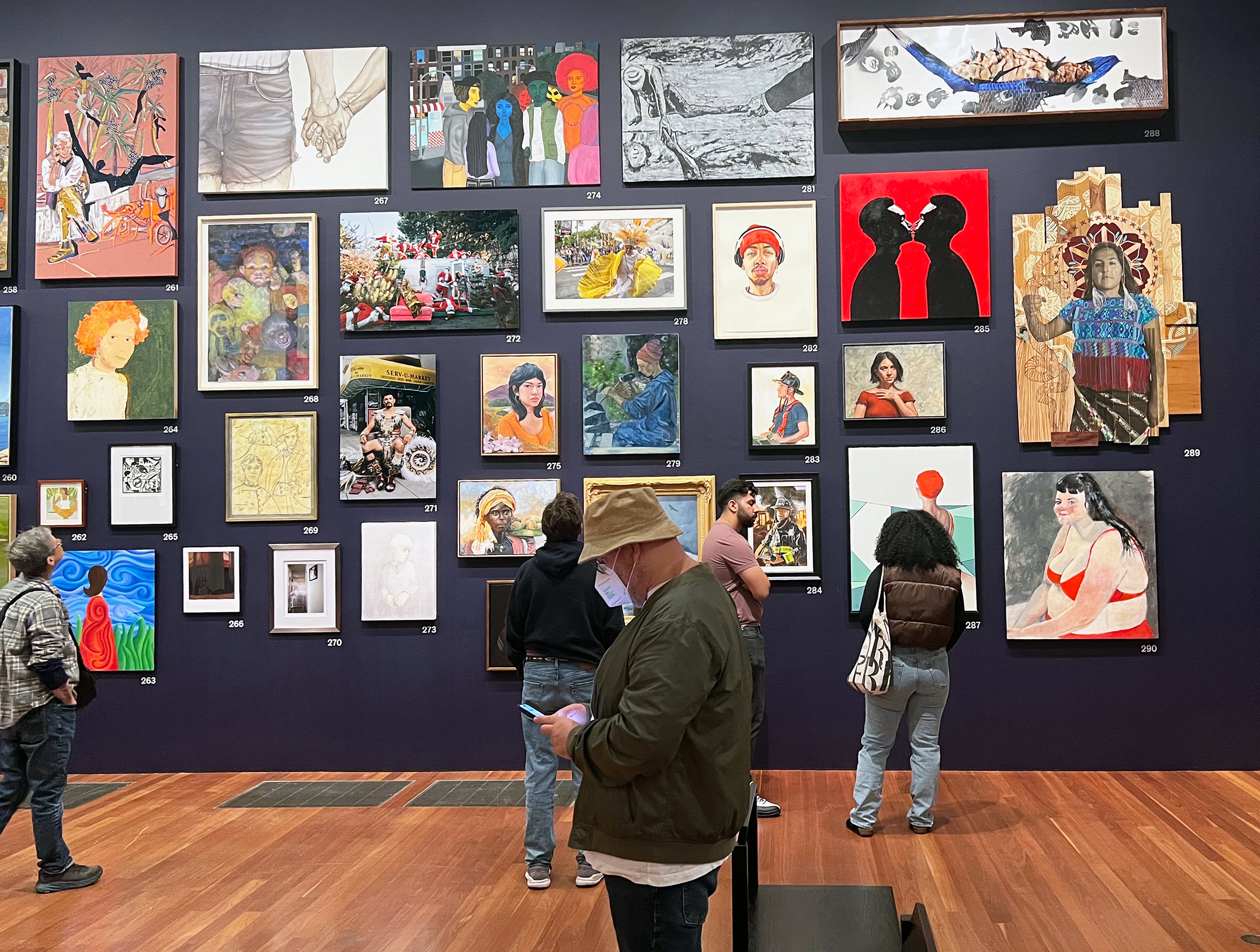Imagine yourself strolling through the sun-kissed vineyards of Italy, a glass of the finest wine in hand, surrounded by rolling hills and centuries-old traditions. Italy’s private vineyard tours offer an enchanting experience to immerse yourself in the heart and soul of one of the world’s most celebrated wine-producing countries. But what truly sets these tours apart is the chance to meet the often-overlooked heroes of the wine world – Italy’s smallest and rarest wine producers.
The allure of private vineyard tours is undeniable. They provide an intimate journey into Italian winemaking, a behind-the-scenes glimpse into the artistry and dedication that result in some of the world’s most exceptional wines. These tours are your passport to uncovering Italy’s hidden wine treasures, often situated in regions less frequented by tourists.
Yet, the opportunity to engage with small, rare wine producers makes these tours truly special. These artisans are crafting wines and weaving tales of tradition, innovation, and passion into every bottle. In this article, we invite you to join us on a journey through Italy’s vineyards as we explore the essence of private vineyard tours and delve into the stories of the dedicated individuals responsible for Italy’s most exceptional yet often overlooked wines.
Exploring Italy’s Hidden Wine Treasures
The Allure of Smaller Producers
A remarkable transformation is taking place in the heart of Italy’s wine country. The grand châteaux and well-established estates no longer dominate the wine industry. A new era is dawning, one characterized by the rise of boutique wineries, and they bring with them a unique allure that captivates wine enthusiasts from around the world.
The Rise of Boutique Wineries
Small boutique wineries have been steadily carving out their niche in Italian wine. Often family-owned and operated, these producers embrace a philosophy that emphasizes quality over quantity. While the industry giants may churn out millions of bottles annually, boutique wineries opt for a more artisanal approach. Their production numbers are limited, and this exclusivity is fundamental to their appeal.
What makes these boutique wineries particularly intriguing is their dedication to preserving tradition. Italy has a deep-rooted winemaking history dating back thousands of years, and many smaller producers are committed to upholding these time-honored practices. This devotion to tradition doesn’t mean a lack of innovation; rather, it’s a harmonious blend of the old and the new.
Preserving Tradition and Passion

Smaller wine producers are often passionate stewards of their land and traditions. Many of these families have been involved in winemaking for generations, and this heritage is palpable in every bottle they produce. They take immense pride in the grape varieties indigenous to their region and understand that their wines reflect the local terroir.
The preservation of tradition extends to farming practices as well. These boutique wineries frequently opt for sustainable, organic, or biodynamic viticulture, respecting the land and the environment. Such practices ensure that their vineyards continue to thrive for generations to come.
Passion is a driving force in the world of boutique wineries. The winemakers are often the face of the operation, and their enthusiasm is infectious. They welcome visitors with open arms, sharing their knowledge and stories, creating a deep connection between the consumer and the product. This personal touch is rarely found in larger wineries, where the winemaker may remain distant.
In essence, the allure of smaller producers lies in their commitment to tradition and unwavering passion for their craft. By choosing to embark on a private vineyard tour with these artisans, you’re savoring exceptional wines and participating in a centuries-old tradition and a labor of love. It’s a chance to discover the essence of Italian winemaking at its most authentic, where each bottle is a testament to the enduring legacy of passionate families and the unique appeal of boutique wineries.
A Journey Off the Beaten Path
Regarding Italian wine, names like Tuscany, Piedmont, and Sicily often steal the spotlight. While these regions are renowned for their winemaking traditions, Italy has a wealth of lesser-known yet equally captivating wine regions waiting to be explored. Embarking on a private vineyard tour in these off-the-beaten-path areas is like opening a treasure chest of hidden gems, revealing Italian wine’s true depth and diversity.
Italy’s Lesser-Known Wine Regions
Venturing off the well-trodden wine paths in Italy leads you to some of the country’s best-kept secrets. Regions like Friuli-Venezia Giulia in the northeast, Umbria in the heart of the country, or the island of Sardinia often fly under the radar of many wine enthusiasts. Yet, these places are oases of unique terroirs and grape varieties waiting to be explored.
Friuli-Venezia Giulia, for instance, is celebrated for its crisp white wines, and the small production wineries here craft some of Italy’s finest Pinot Grigio and Friulano. Similarly, Umbria, known as the “Green Heart of Italy,” offers stunning Sangiovese and Sagrantino wines in a tranquil countryside setting. And then there’s Sardinia, an island paradise known for Vermentino and Cannonau wines, where viticulture dates back to ancient times.
Unearthing these hidden treasures is a journey that rewards the adventurous wine explorer. The wines from these lesser-known regions boast a sense of authenticity, untouched by the commercialization that often characterizes more famous wine destinations.
Uncovering Hidden Gems in the Countryside
The magic of private vineyard tours in Italy’s less-traveled wine regions is discovering hidden gems in the countryside. As you traverse the picturesque landscapes, you’ll encounter charming family-run wineries, often nestled among rolling hills or on tranquil lakes’ shores.
These boutique producers are deeply connected to the land and craft wines that mirror the unique terroirs of their regions. In Friuli-Venezia Giulia, you might be sipping a glass of Picolit in a vineyard surrounded by Alpine peaks. In Umbria, the backdrop might be an ancient hilltop village overlooking vineyards as far as the eye can see. And on the island of Sardinia, a tasting might occur in a centuries-old cellar hewn from the rock beneath the vineyards.
Moreover, private vineyard tours in these lesser-known regions provide unparalleled opportunities for intimate interactions with winemakers and their families. You’ll gain insight into their winemaking philosophy and the history of their estates. It’s common to find yourself breaking bread with these passionate individuals, sharing stories, and forging connections far beyond the wine glass.
A journey off the beaten path in Italy’s lesser-known wine regions is a revelation. It’s an opportunity to explore hidden treasures in the countryside, where boutique wineries and their distinctive wines showcase Italy’s wine regions’ unspoiled beauty and unique cultural heritage. These tours offer an experience deeply rooted in tradition and delivered with a warmth and authenticity that truly set them apart.
Behind the Scenes: Private Vineyard Tours
The Experience of a Lifetime

The allure of private vineyard tours in Italy isn’t solely about the exquisite wines you’ll taste. It’s an immersive journey that offers a behind-the-scenes look into the heart and soul of Italian winemaking. When you embark on one of these tours, you’re in for an experience of a lifetime, where every aspect is carefully curated to delight the senses and create lasting memories.
What to Expect During a Private Vineyard Tour
Private vineyard tours are a step beyond the ordinary wine-tasting experience. As you step onto the hallowed ground of a boutique winery, you’ll find yourself surrounded by the breathtaking beauty of the vineyards. You’ll first notice the tranquility – a stark contrast to the hustle and bustle of everyday life. It’s a moment of respite, a pause in time, where the only thing that matters is the wine and the stories it carries.
The tour typically begins with a warm welcome from the winemaker or a knowledgeable guide. They’ll guide you through the vineyards, sharing insights into the grapes, the terroir, and the winemaking process. It’s an opportunity to understand the unique factors that make each wine special – the soil, the climate, and the artistry of the vintner.
As you explore the winery, you’ll witness the craftsmanship that goes into each bottle. These smaller producers often rely on traditional methods, and the attention to detail is astonishing. From the ancient oak barrels that age the wine to the modern technologies used for quality control, every step is precision and passion.
Personalized Tastings and Interaction with Winemakers
One of the highlights of a private vineyard tour is the personalized tastings. Here, you’re not just handed a glass of wine; you’re invited to savor it in its birthplace. The winemakers are your hosts and take pride in sharing their creations with you. Each wine is carefully selected to represent the best of the winery. As you raise your glass, you’ll be regaled with stories about the particular vintage, the characteristics of the grapes, and the nuances of the winemaking process.
What truly sets these tastings apart is the interaction with the winemakers themselves. They’re not distant figures in a corporate hierarchy; they’re the heart and soul of the winery. You can ask questions, delve into the technicalities of winemaking, or simply listen to their anecdotes and passions. It’s an intimate connection that enriches the tasting experience and provides a profound understanding of the wine’s journey from vine to glass.
In essence, a private vineyard tour in Italy promises an experience of a lifetime where you’ll gain a deep appreciation for the art and science of winemaking. It’s a journey that engages all your senses, from the sight of the rolling vineyards to the aromas of aging wine in the cellars, from the taste of exceptional vintages to the stories that infuse each glass. These tours offer an unparalleled opportunity to connect with the winemakers, understand their passion, and create memories that will linger long after the last drop of wine is savored.
Moreover, private vineyard tours often provide a sensory feast beyond just the wines. You may find yourself surrounded by the heady aroma of ripening grapes, the crisp scent of the vineyard, and the earthy, aged notes of oak barrels. As you stroll through the vine rows, you can touch the leaves and feel the soil, deepening your connection to the land where the grapes are nurtured.
The ambiance during these tours is intimate and relaxed. The backdrop is often a charming courtyard, a centuries-old cellar, or a scenic terrace overlooking the vineyards. The settings are carefully chosen to enhance the overall experience, ensuring every sip is savored in the most picturesque surroundings.
In addition to tastings, some vineyard tours may include food pairings, allowing you to explore the art of matching wines with regional cuisine. You might indulge in delectable cheeses, locally sourced olives, or handmade pasta, all expertly chosen to complement the wines you’re savoring. These gastronomic adventures further enrich the tour, showcasing the harmonious relationship between wine and food, a cornerstone of Italian culture.
As the day draws to a close, you’ll have the opportunity to purchase the wines you’ve tasted, often at exclusive prices. This allows you to take a piece of your unforgettable experience back home and relive the memories each time you uncork a bottle.
A private vineyard tour in Italy is indeed an experience of a lifetime. It’s a journey transcends ordinary wine tasting, immersing you in winemaking, culture, and tradition. Whether you’re a seasoned oenophile or a novice, these tours offer an opportunity to deepen your appreciation for wine, explore the heart of Italian winemaking, and create memories that will stay with you forever. It’s a truly magical experience, where every sip of wine is a testament to the dedication, passion, and artistry of the winemakers and the timeless beauty of the Italian countryside.
Exclusive Access to Italy’s Rare Wines
When it comes to wine, Italy is celebrated for its exceptional varieties, but hidden among its storied vineyards are the rare gems – wines produced in limited quantities, often tucked away from the prying eyes of the wine world. Private vineyard tours offer an exclusive gateway to these well-guarded treasures, providing a once-in-a-lifetime opportunity to explore Italy’s rare and limited-production wines.
Exploring the Rare and Limited-Production Wines
These rare and limited-production wines represent the essence of Italy’s winemaking culture. They result from meticulous craftsmanship and a deep understanding of the land. These small, often family-run wineries pride themselves on quality over quantity, and their rare wines are a testament to this philosophy.
The term ‘limited production’ signifies a lower quantity and exceptional attention to detail. It means that every grape is carefully selected, every barrel meticulously watched, and every bottle meticulously crafted. This level of dedication often translates to higher quality, ensuring that each bottle is an exquisite work of art.
Private vineyard tours allow you to explore the stories behind these rare wines. You’ll have the privilege of walking through the vineyards where the grapes are grown, seeing the cellars where the wine matures, and meeting the individuals responsible for crafting these remarkable vintages. It’s a behind-the-scenes journey into the heart of Italian winemaking, where you’ll come to appreciate the profound commitment to the art of winemaking.
Tasting Italy’s Best-Kept Secrets
The true magic of private vineyard tours unfolds when you can taste Italy’s best-kept secrets. These wines are often unknown to the broader public, and some are unavailable in local wine shops. They remain exclusive to the winery and a select few.
As you savor these rare wines, you’ll discover the uniqueness of each sip. Whether it’s a velvety Barolo, an elegant Super Tuscan, or a complex Amarone, each bottle tells a story of the region it hails from. These wines are a reflection of the land, the climate, and the artistry of the winemaker. Their complexities unfold on your palate, revealing layers of flavors and aromas that only the most discerning wine enthusiasts can experience.
Moreover, these exclusive tastings often include library vintages, showcasing the evolution of the wine over the years. It’s a journey through time, exploring how these rare wines have aged and matured, developing depth and character. The opportunity to taste and compare different vintages is a true rarity, as it provides insight into the wine’s aging potential and the winemaker’s skill.
Private vineyard tours in Italy offer exclusive access to the country’s rare and limited-production wines, providing an intimate look at the art of winemaking and the opportunity to taste Italy’s best-kept secrets. These wines embody passion, tradition, and the connection between the land and the vintner. It’s a once-in-a-lifetime experience that will leave you with a deeper appreciation for the world of wine and a collection of cherished memories from Italy’s hidden corners.
Meeting Italy’s Smallest Wine Producers
Passion-Driven Wine Craftsmanship

Amid the rolling hills of Italy’s picturesque wine regions, a cadre of boutique winemakers toils with a deep-seated passion transcending the ordinary. Their stories are as rich as the wines they produce, and their dedication and innovation set them apart in the world of winemaking.
The Stories and Backgrounds of These Boutique Producers
Each boutique winery in Italy is a tapestry woven from the life stories of its founders and the generations that came before. These wine producers are often deeply connected to their land, with family histories spanning decades, if not centuries.
Take, for instance, the family-owned vineyard in Tuscany, where the current generation cultivates the same vineyards that their great-great-grandparents tended. The deep roots in the region are reflected in the wines, which draw from age-old traditions and techniques passed down through generations. Such producers often have a keen sense of stewardship, understanding that their role is to preserve and enhance their inherited legacy.
In contrast, there are boutique wineries founded by individuals who, captivated by the allure of winemaking, decided to leave their former lives behind and start anew. These visionaries bring fresh perspectives and innovative approaches to their craft. Their backgrounds might span different industries, from finance to engineering, but their common thread is an unwavering passion for wine.
The Dedication and Innovation That Define Their Wines
The dedication of boutique winemakers is unparalleled. They are intimately involved in every aspect of the winemaking process, from tending to the vines and harvesting the grapes to fermenting and aging the wine. The hands that craft these wines are the same ones that nurture the soil and pluck the grapes at the peak of ripeness.
In the cellars, innovation often takes center stage. Smaller wineries can experiment with different winemaking techniques, blending modern technology with time-honored traditions. The result is a wine portfolio that pushes the boundaries of what’s possible in Italian winemaking.
For instance, with amphorae and ancient clay vessels used for fermentation and aging, Boutique producers in regions like Campania have rekindled this centuries-old tradition, creating unique wines with distinct characteristics. Similarly, experimentation with lesser-known grape varieties, such as Aglianico or Vermentino, creates distinctive and memorable wines that stand out in a crowded market.
The dedication and innovation of these boutique winemakers extend to their commitment to sustainability. Many prioritize eco-friendly practices, such as organic and biodynamic viticulture. They understand that by caring for the land and the environment, they ensure the continued prosperity of their vineyards for generations to come.
The heart of boutique winemaking in Italy is passion-driven craftsmanship that reverberates through their wines. The stories and backgrounds of these producers enrich the tapestry of Italian winemaking, and their dedication and innovation are the driving forces behind their exceptional creations. These wineries are not just places where wine is made; they are living testimonies to the enduring love and commitment that define the world of boutique Italian wine.
Sustainability and Tradition
The world of Italian wine is one where tradition runs deep, and for boutique winemakers, preserving this heritage is intertwined with their commitment to sustainability. These smaller producers have found a way to balance eco-friendly practices with centuries-old traditions, resulting in a harmonious blend that defines their approach to winemaking. At the heart of this fusion lie unique, sustainable viticulture methods that set them apart in wine.
How Smaller Producers Balance Eco-Friendly Practices with Tradition
Tradition and sustainability may appear at odds. After all, many centuries-old winemaking techniques involve resource-intensive and environmentally taxing practices. However, boutique winemaking in Italy is one of innovation, where these winemakers have seamlessly merged old-world practices with modern sustainability.
One of the primary ways this balance is achieved is through meticulous vineyard management. Smaller producers understand the importance of soil health and often employ organic or biodynamic farming practices. By eschewing chemical pesticides and fertilizers, they create vineyards that are environmentally friendly and more resilient in the face of pests and disease.
Additionally, many boutique winemakers opt for hand harvesting, a tradition passed down through generations. This practice ensures the gentle handling of the grapes and creates employment opportunities in the local community. The commitment to tradition extends to the winery itself, with many smaller producers using old-fashioned techniques such as natural fermentation and aging in traditional oak barrels.
Unique Sustainable Viticulture Methods
Smaller producers in Italy have embraced unique, sustainable viticulture methods, demonstrating their dedication to the environment and their craft. One such method uses cover crops, where alternative plants like clover or legumes are grown between the vine rows. These cover crops reduce soil erosion and improve the vineyard’s health by fixing nitrogen and enhancing soil structure.
Biodiversity plays a pivotal role in sustainable viticulture. Boutique winemakers often allow wildflowers and other native plants to flourish around the vineyards. This creates a vibrant ecosystem and attracts beneficial insects that help control pests naturally, reducing the need for chemical interventions.
Water conservation is another critical aspect of sustainability. Many smaller producers have implemented advanced irrigation systems that monitor soil moisture levels to optimize water use. In regions where water is a precious resource, these technologies help ensure every drop counts.
Moreover, solar panels and other renewable energy sources are increasingly prevalent in boutique winemaking. These investments reduce the winery’s carbon footprint and create a more sustainable future.
Boutique winemakers in Italy have found a delicate balance between tradition and sustainability. Their commitment to eco-friendly practices is woven into the very fabric of their winemaking philosophy. By embracing unique, sustainable viticulture methods and preserving centuries-old traditions, these producers have become stewards of the land and the environment, ensuring that their wines are exceptional and environmentally responsible. Their approach to winemaking is a testament to the harmonious coexistence of tradition and modernity in Italian wine.
The Best Italian Wine Comes from the Smallest Places
The Essence of Terroir
In the world of wine, the concept of terroir is sacred. It’s the belief that a wine’s flavor is not just the result of the grapes and the winemaking process but is deeply influenced by the unique combination of the land, the climate, and the traditions of the region in which it’s produced. Boutique winemakers in Italy have taken this concept to heart, excelling in showcasing terroir and bringing forth the distinctive flavors of each region.
How Small Producers Excel in Showcasing Terroir
For boutique winemakers, terroir is more than just a concept; it’s a way of life. These producers understand that the essence of terroir is what sets their wines apart in a crowded market. To express this essence, they focus on the smallest details, from the specific microclimates of their vineyards to the individual grape varieties they cultivate.
The vineyards themselves are a reflection of the terroir. Smaller producers often have plots of land scattered throughout different regions. This diversity allows them to produce wines representing each location’s unique terroir. For example, a winery in Piedmont might have vineyards in the Langhe Hills and the Roero region. Each site imparts its characteristics to the grapes, resulting in wines that taste vastly different despite their geographical proximity.
Furthermore, many boutique winemakers embrace the concept of minimal intervention. They believe that the less they interfere with the natural processes, the more faithfully the terroir is expressed in the final product. These winemakers favor gentle winemaking methods that don’t overly manipulate the grapes, allowing them to shine independently.
A Focus on the Distinctive Flavors of Each Region

The true beauty of boutique winemaking in Italy is the ability to taste the distinctive flavors of each region. This diversity is evident even in a single varietal, such as Sangiovese. Sangiovese might yield wines with bright cherry and floral notes in Tuscany’s Chianti Classico region. Montalcino transforms into Brunello, with richer, more complex flavors of dark fruit, leather, and tobacco. These nuances are a testament to the power of terroir.
The essence of terroir is further emphasized through indigenous grape varieties. Smaller producers often champion the lesser-known, native grapes deeply connected to a specific region. Grapes like Nerello Mascalese on Sicily’s Mount Etna or Lacrima di Morro d’Alba in the Marche region possess flavors and aromas unique to their terroir. It’s a journey of discovery for the palate, exploring the tastes and scents that define each corner of Italy.
Moreover, the commitment to terroir extends to aging practices. Smaller wineries often use traditional methods like aging in large oak barrels to impart subtler flavors to the wine and allow the terroir to shine through. It’s a conscious choice to let the grapes, the land, and the climate speak for themselves.
The essence of terroir is at the heart of boutique winemaking in Italy. These producers excel at showcasing their regions’ unique characteristics, from the vineyards’ microclimates to the native grape varieties they cultivate. Through minimal intervention and traditional winemaking methods, they capture the distinctive flavors of each region, allowing wine enthusiasts to embark on a sensory journey through Italy’s diverse terroirs. These wines are not just beverages; they are profound expressions of the land, the climate, and the traditions that shape them.
Awards and Accolades
In the world of wine, accolades and recognition are often associated with the grand estates and celebrated labels. However, boutique winemakers who have garnered prestigious awards and accolades are hidden among Italy’s vineyard-covered hills and lesser-known regions. These smaller producers have proven that excellence knows no size, and their award-winning wines from the hidden corners of Italy deserve the highest praise.
Recognition for Italy’s Smallest Wine Producers
The spotlight may not always shine on Italy’s smallest wine producers, but the quality and dedication they pour into their craft have not gone unnoticed. In recent years, there has been a growing appreciation for the wines produced by these boutique wineries. International wine competitions and critics have begun to recognize their exceptional contributions to the world of viticulture.
Their unwavering commitment to quality over quantity sets these small producers apart. They often work with limited quantities of grapes, allowing them to give meticulous attention to every aspect of the winemaking process. These producers pour their heart and soul into every bottle from the vineyard to the cellar.
Moreover, many boutique winemakers have embraced sustainable and organic practices, aligning their commitment to the environment with their dedication to producing exceptional wines. The recognition of their sustainability efforts has led to awards for their contribution to a more eco-friendly wine industry.
Award-Winning Wines from Hidden Corners of Italy
The award-winning wines from Italy’s hidden corners are a testament to the diversity and richness of the country’s terroir. Boutique winemakers have crafted exceptional, award-worthy wines in these lesser-known regions, such as Le Marche, Basilicata, or Abruzzo.
For instance, Le Marche, a region tucked away on the eastern coast, is known for its white wine, Verdicchio. Boutique producers here have created Verdicchio wines that have received international acclaim thanks to the region’s unique terroir and the winemakers’ dedication.
Basilicata, in the south of Italy, is the birthplace of the Aglianico grape, producing wines that have received top awards. These winemakers have managed to bring out the best in Aglianico, creating rich, complex wines that deserve recognition.
Similarly, in Abruzzo, boutique wineries have focused on the Montepulciano grape, crafting wines that have been lauded for their depth and approachability. The region’s unique microclimate and the passion of the producers have contributed to these award-winning vintages.
It’s not only indigenous grape varieties that have received accolades. Boutique winemakers in lesser-known regions have also worked with international varieties, demonstrating their versatility and creativity in producing wines that have captured the attention of wine connoisseurs and critics alike.
Awards and accolades in the wine world have traditionally been associated with larger estates, but Italy’s smallest wine producers have shattered this stereotype. Their unwavering commitment to quality and sustainability, combined with their focus on lesser-known regions and grape varieties, has resulted in award-winning wines gaining well-deserved recognition. These wines are a testament to the talent and dedication of boutique winemakers and the diversity of Italy’s terroir, waiting to be explored and celebrated by wine enthusiasts worldwide.
Wine enthusiasts often have burning questions about Italy’s vineyards, wine regions, and the nuances of the country’s winemaking culture. This section will delve into the most frequently asked questions, unraveling the mysteries of Italy’s world-renowned vineyards and the secrets behind its exceptional wines.
What is the most expensive vineyard in Italy?
Exploring Italy’s High-End Vineyard Estates
While Italy is home to countless prestigious vineyards, the title of the “most expensive” vineyard can be a matter of perspective. However, a few estates command top-tier prices due to their exceptional terroir, the reputation of their wines, and exclusivity.
One such vineyard is the Masseto Estate in Tuscany. Masseto is celebrated for its iconic Merlot wines in the Bolgheri wine region. The limited production and the vineyard’s unique characteristics have made Masseto a sought-after name among collectors. However, other regions like Piedmont’s Barolo or Barbaresco have their high-end vineyards with significant price tags, reflecting the excellence of their wines and the heritage of the land.
Price Factors and Exclusivity
The price of a vineyard in Italy depends on various factors, including the region, the grape varieties cultivated, the vineyards’ age and condition, and the estate’s reputation. Exclusivity often plays a crucial role, with some family-owned vineyards being inaccessible to the public.
Moreover, vineyards that have received critical acclaim and high scores from wine critics tend to command higher prices. The scarcity of certain grape varieties or the limited production of renowned estates can also significantly impact the cost of a vineyard.
In essence, the most expensive vineyards in Italy are not just about the cost; they represent a legacy of exceptional wines, time-honored traditions, and the allure of owning a piece of Italy’s winemaking history.
What part of Italy has the best vineyards?
Spotlight on Italy’s Renowned Wine Regions
Determining the best vineyards in Italy is a subjective endeavor, as it largely depends on personal preferences. Italy boasts a wealth of renowned wine regions, each with unique charm and specialties.
Tuscany, in central Italy, is often celebrated for its exceptional vineyards. The Chianti Classico region stands out with its rolling hills and Sangiovese vineyards. The adjacent region of Brunello di Montalcino is renowned for its Sangiovese Grosso, while the Bolgheri area produces exceptional Super Tuscans.
In the northwest, Piedmont is famed for its Barolo and Barbaresco vineyards. These regions are known for their Nebbiolo grapes, producing some of Italy’s most iconic wines.
In the northeast, Veneto is home to the Valpolicella and Amarone vineyards. The Veneto region is celebrated for its unique appassimento winemaking technique, which lends depth and richness to the wines.
Sicily, an island in the south, is gaining recognition for its diverse terroirs and indigenous grape varieties. Regions like Etna and Marsala are creating wines reflecting volcanic soil and coastal influences.
The Unique Characteristics of Each Area
The allure of Italy’s vineyards lies in the diversity of its regions. Tuscany offers elegance and refinement, while Piedmont exudes complexity and structure. Veneto boasts rich, full-bodied wines, and Sicily combines tradition and innovation.
Each region has unique characteristics that make it special, and the best vineyards can be found in those regions that align with your wine preferences. It’s a matter of exploring the diverse terroirs and tasting the wines to discover which part of Italy resonates most with your palate.
Where does the best Italian wine come from?
The Connection Between Wine Quality and Origin
The “best” Italian wine concept is subjective, depending on individual tastes and preferences. Italy is renowned for its exceptional wines, and quality can be found in various regions throughout the country.
Italian wine quality is closely tied to the concept of terroir, which refers to the unique combination of factors such as soil, climate, and local traditions that influence the characteristics of a wine. Therefore, the “best” Italian wine often comes from regions deeply connecting to these elements.
Italy’s top wine-producing regions include Tuscany, Piedmont, Veneto, and Sicily. Each region offers a different style of wine, whether it’s the robust reds of Tuscany, the elegant Barolos of Piedmont, the crisp whites of Veneto, or the diverse offerings of Sicily.
Italy’s Top Wine-Producing Regions
- Tuscany: Known for its Sangiovese-based wines, including Chianti, Brunello di Montalcino, and Super Tuscans.
- Piedmont: Famed for its Nebbiolo-based Barolo and Barbaresco wines, considered some of Italy’s finest.
- Veneto: Home to Valpolicella, Amarone, and Prosecco, Veneto offers a wide range of styles, from light and fruity to rich and complex.
- Sicily: With its diverse terroirs, Sicily produces a wide range of wines, including reds like Nero d’Avola and whites like Grillo, showcasing the island’s unique flavors.
However, the “best” Italian wine can also depend on the specific wine variety. For instance, if you adore Merlot, you might turn to the Bolgheri region in Tuscany, which produces some of Italy’s most remarkable Merlot-based wines. Alternatively, explore the northern regions of Alto Adige and Friuli-Venezia Giulia for Pinot Grigio.
Ultimately, the “best” Italian wine is the one that resonates most with your palate. Italy’s diverse regions offer an array of flavors and styles, and the beauty of Italian wine lies in its versatility, ensuring there’s something for every wine enthusiast to savor.
What do you call a winery in Italian?
The Italian Term for a Winery
In Italian, a winery is called “cantina” or “azienda vinicola.” The term “cantina” is often used to describe a wine cellar or a place where wine is stored and aged. It conveys a sense of tradition and craftsmanship, reflecting the importance of cellars in the winemaking process.
The term “azienda vinicola” translates to “wine company” or “wine estate.” It encompasses the broader aspects of wine production, including the vineyards, winemaking facilities, and the business side of wine production. It reflects the modern approach to winemaking that encompasses both tradition and innovation.
The Cultural Significance of Winemaking in Italy
The Italian term for a winery is more than a linguistic label; it reflects the cultural significance of winemaking in Italy. Winemaking in Italy is not just an industry; it’s a way of life. It’s deeply rooted in the country’s history and traditions, with wineries often being family-owned and passed down through generations.
The term “cantina” evokes images of ancient cellars where barrels of wine quietly age, filled with the stories of years gone by. “Azienda vinicola” represents the modern, forward-thinking wineries that blend technology and tradition to create exceptional wines.
In Italy, the art of winemaking celebrates heritage, terroir, and the unique relationship between the land and its people. Whether you call it a “cantina” or an “azienda vinicola,” it symbolizes the craftsmanship, passion, and enduring connection to the land that defines Italian winemaking.
Italy’s vineyards, wineries, and winemaking culture offer a rich tapestry of traditions, flavors, and stories. The most frequently asked questions about Italian wine touch upon the diverse regions, the quality of wines, and the cultural significance of winemaking. Whether you’re exploring the most expensive vineyards, the best wine regions, or the Italian term for a winery, Italy’s wine world invites you to embark on a sensory journey and uncover the hidden treasures of its terroir.
The best-kept secrets of the country’s winemaking heritage lie in the heart of Italy’s picturesque landscapes, hidden among rolling hills and lush vineyards. Private vineyard tours with Italy’s smallest and rarest wine producers are a journey of discovery and a pathway to a world where tradition meets innovation and passion drives craftsmanship.
The charm of these intimate tours isn’t just in the tasting but in the stories that unfold with each sip. You’ll find yourself walking in the footsteps of generations, witnessing the meticulous processes of smaller producers who prioritize quality above all else. It’s a reminder that in a world of mass production, there are still those who put their heart and soul into every bottle.
As you venture off the beaten path, you’ll explore Italy’s lesser-known wine regions, each with a unique character and terroir. It’s an opportunity to uncover hidden gems in the countryside, savor wines that reflect their land’s essence, and experience the culture and tradition that have shaped them.
Private vineyard tours provide an authentic immersion into the world of Italian winemaking. You’ll meet the passionate individuals who dedicate their lives to the craft, the families who have preserved their heritage through generations, and the visionaries who have brought fresh innovation to the field. It’s a reminder that winemaking is more than a business; it’s a labor of love.
These tours offer more than just wine; they provide an insight into the very soul of Italy. The ambiance, the flavors, and the stories all come together to create an experience of a lifetime. Whether you’re a seasoned wine enthusiast or a curious novice, private vineyard tours in Italy beckons, inviting you to explore the heart of Italian winemaking, taste the rarest wines, and create memories that will last forever.
So, as you raise a glass of Italy’s finest, remember that behind every label, there’s a story waiting to be told, a tradition waiting to be shared, and a passion waiting to be savored. Cheers to the beauty of private vineyard tours, where Italy’s smallest and rarest wine producers open their doors, cellars, and hearts, offering a magical experience.








